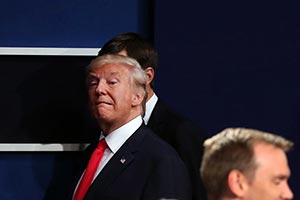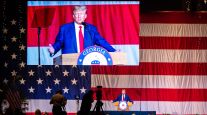Deutsche Bank: Trump Could Push the US Economy and Stock Markets to New Records

It's looking more likely that President-elect Donald Trump will preside over a continuing U.S. expansion that could take its place as the longest among American business cycles, according to Deutsche Bank AG. And Chief U.S. Equity Strategist David Bianco predicts that by the time the real estate mogul takes office in January, the S&P 500 Index will eclipse 2,250.
Investors are under-appreciating the "much higher chance now of a long-lasting economic expansion that rivals the 10 year U.S. record," the strategist writes. "We're more confident now that the S&P will reach 2,500 in 2018 before suffering its next bear market."
RELATED: Analysis - The trouble with Donald Trump's infrastructure plan
The longest U.S. expansion on record stretched from 1991 until 2001, a span of 120 months. That streak will be broken if the American economy makes it until 2019 without a recession.
The structural decline in potential growth means that it doesn't take as large a negative shock as it used to in order to precipitate a downturn in U.S. activity. Conversely, the rising portion of retirees on Social Security increases the stickiness of consumption, dampening the variability of the largest component of GDP.
RELATED: Trump team floats ‘infrastructure bank’ derided by campaign
While Bianco doesn't discount the risks to Corporate America's bottom line posed by a rising U.S. dollar, potential protectionist trade policies under a Trump administration, and the rise in Treasury yields, he thinks the more important things for investors to focus on are lower taxes and the increase in bank profitability.
Deutsche Bank estimates that the U.S. corporate tax rate will be cut to about 25% — which would bring it in line with the Organization for Economic Co-operation and Development (OECD) average — and suggests that every 5 percentage-point cut lifts the earnings per share of S&P 500 companies by a cumulative $5.
As such, Bianco upped his earnings per share target for the S&P 500 to "at least" $130 for 2017, which would constitute annual growth of more than 9% (assuming his 2016 estimate of $119 is on the mark). "We’re unsure how much the U.S. corporate tax rate will be cut, but we think a significant cut is likely," the strategist writes.
In the absence of measures to encourage the repatriation of profits held overseas, this corporate tax reduction would provide the most benefit to domestically oriented companies. The Russell 2000 Index has massively outperformed the S&P 500 since Nov. 8.
A special repatriation tax holiday could further buoy financial asset prices, particularly if the proceeds were used for share buybacks, dividend boosts or M&A.
Meanwhile, bonds won't become attractive enough of an alternative to crimp stock valuations or cause companies to face higher interest expenses. The continuation of the Fed's tightening cycle will keep the labor market from overheating and put a cap on the longer end of the U.S. Treasury yield curve, he added. As such, Bianco recommends that investors in need of income should turn to utilities stocks, which have been battered since the election.
"Utilities benefit from: 1) a lower U.S. corp tax rate, given nearly 100% U.S. profits and thus no foreign exchange risk, 2) likely continued 15% tax rate on dividends versus income tax rates for interest income and the 3.8% Affordable Care Act tax is likely dropped, 3) more federal infrastructure grants and loans for transmission upgrades, 4) a safe haven for retirees and institutions looking to reduce fixed income exposure," he concludes.


